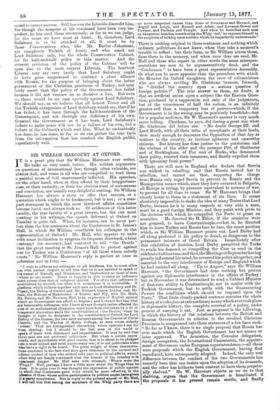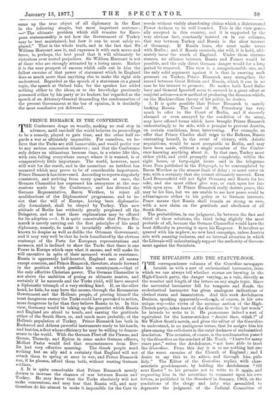SIR WILLIAM HARCOURT AT OXFORD.
IT is a great pity that Sir William Harcourt ever writes, He talks so very much better. His written arguments on questions of international law, though often valuable, are always dull, and rouse in all who are compelled to read them a painful sense of toil unnecessarily inflicted. His speeches~ on the other hand, often as they offend by their inopportune- ness, or their audacity, or their too obvious want of earnestness- and conviction, are usually very delightful reading. Sir William Harcourt has always a story to offer that amuses; or a quotation which ought to be hackneyed, but is not ; or a com- pact statement in which the most involved affairs sometimes become lucid, and always look so. Of evidences of this latter faculty, the true faculty of a great lawyer, but the one most wanting in his writings, the speech delivered at Oxford on Tuesday is quite full. What, for instance, can be more per- fect than the few sentences about the Conference in St. James's Hall, in which Sir William overthrew his colleague in the representation of Oxford ? Mr. Hall, who appears to unite with some inclination to epigram its frequent drawback, a faint contempt for accuracy, had ventured to tell " the Druids" that the great meeting at St. James's Hall to protest against was for Turkey was a Conference " of all those whom nobody trusts." Sir William Harcourt's reply is perfect at once in substance and in form :- "I wish to address my colleague in all kindness, but he must allow me, with perfect respect, to tell him that he is not entitled to speak of the names of Russell, and Gladstone, and Shaftesbury as those of men ' whom no one trusts.' There is happily in this country no influence mere potent than that of religious opinion. Too often that influence is neutralised by discord, but when it is unanimous it is irresistible. A platform which collects together such men as Lord Shaftesbury and Dr. Pansy, the Bishop of Oxford and Mr. Richard, Canon Liddon and Mr. Dale, the Bishops of Manchester, of Exeter, and Ely, with Mr. Miall, Mr. Davies, and Mr. Newman Hall, is an expression of English opinion which no Government can afford to despise ; and I cannot but fear that my honourable colleague, who I have always thought rather affected the poet of an ecclesiastical champion, must have been overtaken by a fit of temporary aberration amid the convivialities of the Druids,' when he thought it right to designate to the constituency of Oxford the Lord Bishop of the diocese, the two most eminent among the Canons of Christ Church, and the Warden of liable College, as men whom nobody trusts.' They are distinguished characters, whose opinions I am far from sharing, but I should be the last man in the world to speak of them with disrespect and impertinence. It may be said that these men are not professed politicians. But when a nation appre- hends, and apprehends with good reason, that it is about to be plunged into a most unjust and most unnecessary war, it is not politiciansalone wke have a right to be heard. The great weight of these demonstra- tions consisted in the fact that they gave utterance to the earnest and solemn protest of men who seldom take part in political affairs, except when they are deeply convinced that the honour of the country is in imminent danger. Mr. Hall asks with triumph, Where were the Whigs?' Well, perhaps I know a little more about the Whip than he- does. It is quite true it was thought the expression of public opinion to which that Conference gave voice would be more effeetive, in the absence of those whose active participation in polities mig' ht halm von it is party complexion. But in reply to the pointed appeal of Hr. I will tell him that among the members of the Whig party there are
no more respected names than those of Grosvenor and Howard, and Argyll and Leigh, and Russell and Adair, and Leveson-Gower and Cowper, and Durham and Temple. And when he describes such men as dangerous fanatics, constituting the Whig 'tail,' he exposes himself to the suspicion of talking upon matters which he imperfectly understands!'
There is nothing original in those sentences, and nothing which ordinary politicians do not know, when they take a moment's trouble to reflect ; but their form, as Sir William utters them, fixes them in the memory, and when once they are read, Mr. Hall and those who repeat in other words the same misrepre- sentations are seen to be argumentatively dead, and the " Conference " to have been a great representative Assembly. Or what can be more apposite than the precedent with which the Member for Oxford slaughters the crew of calumniators who are always reviling Mr. Gladstone because, forsooth, he " divided the country upon a serious question of foreign politics I" The true answer to them, no doubt, is that an artificial union upon a subject like the Eastern Ques- tion, produced by a suppression not only of the judgments, but of the consciences of half the nation, is an infinitely greater evil than a temporary loss of power—which, if the Government is in the wrong, may be positively beneficial—but for a popular audience, Sir W. Harcourt's answer is very much more telling. Chatham, he says, did during a great war what Mr. Gladstone did before one. " No doubt George III. and Lord North, with all their tribe of sycophants at their heels, were ready enough to denounce the Opposition of that day as traitors to the country, as factious agitators and unworthy citizens. But history has done justice to the patriotism and the wisdom of the elder and the younger Pitt, of Shelburne and of Rockingham, of Fox and of Burke, who denounced their policy, resisted their measures, and finally expelled them with ignominy from power."
There are still men in England who declare that Servia was wicked in rebelling, and that Russia incited her to rebellion, and cannot see that, supposing the charge true, Russia only urged Servia to prevent in Bosnia and the Herzegovina scenes which, since they have occurred in Bulgaria, all Europe is trying, by pressure equivalent to menace of war, to prevent for all time to come. Sir W. Harcourt brings that clearly home to them in a statement of six lines. It seems absolutely impossible to shake the idea of many Tories that Lord Derby, because he is in many respects so very able a man, must be a good foreign Minister, and they point with pride to the decision with which he compelled the Porte to grant an armistice. He directed Sir H. Elliot, if the armistice were not granted, to leave Constantinople,—that is, he directed him to leave Turkey and Russia face to face, the exact position which, as Sir William Harcourt points out, Lord Derby had all along professed it his policy to dread, as dangerous to the permanent interests of Great Britain. Immediately after this exhibition of decision, Lord Derby permitted the Turks to evade his demand, so compelling the Czar to send in the celebrated ultimatum, and then,the Meetings of September having greatly influenced his mind, he reversed his policy altogether, and assented to the very interference of Europe and England which he had resisted all along. "Up to August," says Sir William Harcourt, "the Government had done nothing but protest against any diplomatic interference in the affairs of Turkey ; but in November it was determined to send a Cabinet Minister of first-rate ability to Constantinople, not to confer with the Turkish Government, but to settle with the Guaranteeing Powers the conditions which should be imposed upon the Porte." That little closely-packed sentence contains the whole history of a volte-face as extraordinary as any which ever took place in diplomatic history, the complete reversal of a policy, under pretext of carrying it out. Just as pregnant is the following, in which the history of the relations between the British and Russian Governments in relation to the revolted Christian Provinces is compressed into three sentences of a few lines each. " So far as I know, there is no single proposal that Russia has ever made which the English Government has not sooner or later approved. The Armistice, the Consular delegation, foreign occupation, the International Commission, the appoint- ment of Governors under European superintendence,—all these were proposals which the English Government, having first repudiated, have subsequently adopted. Indeed, the only real difference between the conduct of the two Governments has recently been-that one insists upon the adoption of its demands, and the other has hitherto been content to have them perpetu- ally shelved." Sir W., Harcourt objects as we do to that shelving, argues. that the Government is humiliated if the proposals it has pressed remain sterile, and finally
sums up the true object of all diplomacy in the East in the following simple, but most important sentence :
• -.+44 The ultimate problem which still remains for Euro- pean statesmanship is not how the Government of Turkey may be best maintained, but how it can be most safely re- placed." That is the whole truth, and in the fact that Sir William Harcourt sees it, and expresses it with such nerve and force, is, perhaps, the best proof that it will ultimately be victorious over rooted prejudices. Sir William Harcourt is not of those who are strongly attracted by a losing cause. Rather it is the near prospect of success which calls out in him the fullest exercise of that power of statement which in England does so much more than anything else to make the right side understood. Regarded as the speech of a statesman on a grand topic, the speech at Oxford fails, for the speaker has added nothing either to the ideas, or to the knowledge previously possessed either by his party or its leaders; but regardedas the speech of an Attorney-General demanding the condemnation of the present Government at the bar of opinion, it is decidedly the most conclusive yet delivered.







































 Previous page
Previous page